Thursday, November 12th 2020
Highpoint Announces SSD7540 8-port M.2 NVMe SSD RAID Card
HighPoint Launches the Industry's first 8-Port PCIe 4.0 x16 M.2 NVMe RAID Controller -the SSD7540. Powered by a cutting-edge Gen4 switch chipset and the latest iteration of HighPoint's blazing fast NVMe RAID engine, the SSD7540 is capable of delivering unbeatable Gen4 transfer performance while supporting up to 64 TB of storage.
The SSD7540 boasts the highest port-count and performance capability of any single-controller M.2 NVMe RAID solution in today's marketplace. Each of the eight independent M.2 ports can support any off-the-shelf Gen4 or Gen3 NVMe SSD, up to 8 TB in size. The SSD7540's NVMe RAID engine and has been fine-tuned for native PCIe Gen4 hardware platforms, and can take full advantage of the dedicated PCIe Gen 4 x16 host connectivity to deliver 28,000 MB/s of transfer performance.Truly Independent, Cutting-Edge PCIe Gen 4 NVMe RAID Storage Solution for AMD & Intel Platforms
Unlike most PCIe Gen4 NVMe storage devices in today's marketplace, which are tied to a specific hardware platform or brand of SSD or motherboard, SSD7500 series controllers are truly independent NVMe RAID solutions.
SSD7500 series controllers do not require motherboard platforms with Bifurcation support, or any specialized software released by SSD manufactures; any AMD-based system with a dedicated PCIe 4.0 x16 slot can now take full advantage of the industry's fastest storage solution. Our NVMe RAID stack was designed to excel in high-end workstation and server environments, and intelligently utilize multi-core processors to maximize the performance potential of Gen4 NVMe storage.
In addition, SSD7500 series controllers are fully backwards compatible with Intel PCIe 3.0 platforms, enabling customers to take full advantage of advanced Gen 4 storage media without migrating to a new computing environment.
Hyper Cooling Solution Ensures Sustained Gen 4 Transfer Performance
Maximizing Gen4 NVMe storage performance without the proper implementation of modern cooling apparatus is a risky proposition. This is especially true for Gen4 M.2 configurations. PCIe 4.0 NVMe SSD's generate considerable heat under heavy load, and these SSDs are often housed directly within the NVMe solution itself; outside the reach of the platform's cooling fans. To combat the threat of overheating, the SSD7540 employs a completely new, ground-up redesign of our proven NVMe cooling system. HighPoint's Low-Noise Hyper-Cooling solution ensures your M.2 NVMe SSD's consistently operate within their recommended temperature thresholds, even under sustained I/O, by combining a full-length anodized aluminium heat sink with a pair of ultra-durable, near-silent fans, and high-conductivity thermal pad. This innovative, ultra-efficient cooling system rapidly transfers waste-heat away from critical NVMe and controller componentry, without introducing unwanted distraction into your work environment.
Comprehensive Platform Support
The SSD7540 NVMe RAID controller can be easily integrated into any modern computer platform. Extensive software support is available for all major operating system platforms including Linux Distributions, macOS and Windows, and the controller hardware is fully backwards compatible with Intel PCIe Gen 3 platforms. SSD7500 series controllers can maximize the performance of any SSD configuration in today's marketplace.
The SSD7540 is an ideal bandwidth upgrades for Gen3 SSD's, and applications that require transfer speeds between 15,000 and 24,000 MB/s. Gen3 SSD's offer as much as 25% savings over equivalent Gen 4 models, and superior PCIe 4.0 bandwidth ensures maximum performance for both RAID and non-RAID storage configurations.
Comprehensive NVMe RAID Management
When it comes to maintaining critical storage configurations, each customer has specific needs and preferences. The Web RAID Management Interface (WebGUI) is a simple, intuitive web-based management tool and is ideal for customers who are new to RAID technology.The CLI (command line interface) is a powerful, text-only management interface designed for advanced users and professional administrators. Comprehensive user guides are available for both interfaces are available from each controller's Software Updates webpage.Both interfaces were designed to streamline NVMe Storage Management. Customers can easily track TBW (Terabytes Written) and the temperature of each individual NVMe SSD, ensure the SSD7000 controller is using the fastest available PCIe slot, configure an event-log with email notification, and monitor the status of critical RAID configurations in person or remotely via an internet connection.
SSD7500 Series NVMe RAID Controllers
The SSD7540 boasts the highest port-count and performance capability of any single-controller M.2 NVMe RAID solution in today's marketplace. Each of the eight independent M.2 ports can support any off-the-shelf Gen4 or Gen3 NVMe SSD, up to 8 TB in size. The SSD7540's NVMe RAID engine and has been fine-tuned for native PCIe Gen4 hardware platforms, and can take full advantage of the dedicated PCIe Gen 4 x16 host connectivity to deliver 28,000 MB/s of transfer performance.Truly Independent, Cutting-Edge PCIe Gen 4 NVMe RAID Storage Solution for AMD & Intel Platforms
Unlike most PCIe Gen4 NVMe storage devices in today's marketplace, which are tied to a specific hardware platform or brand of SSD or motherboard, SSD7500 series controllers are truly independent NVMe RAID solutions.
SSD7500 series controllers do not require motherboard platforms with Bifurcation support, or any specialized software released by SSD manufactures; any AMD-based system with a dedicated PCIe 4.0 x16 slot can now take full advantage of the industry's fastest storage solution. Our NVMe RAID stack was designed to excel in high-end workstation and server environments, and intelligently utilize multi-core processors to maximize the performance potential of Gen4 NVMe storage.
In addition, SSD7500 series controllers are fully backwards compatible with Intel PCIe 3.0 platforms, enabling customers to take full advantage of advanced Gen 4 storage media without migrating to a new computing environment.
Hyper Cooling Solution Ensures Sustained Gen 4 Transfer Performance
Maximizing Gen4 NVMe storage performance without the proper implementation of modern cooling apparatus is a risky proposition. This is especially true for Gen4 M.2 configurations. PCIe 4.0 NVMe SSD's generate considerable heat under heavy load, and these SSDs are often housed directly within the NVMe solution itself; outside the reach of the platform's cooling fans. To combat the threat of overheating, the SSD7540 employs a completely new, ground-up redesign of our proven NVMe cooling system. HighPoint's Low-Noise Hyper-Cooling solution ensures your M.2 NVMe SSD's consistently operate within their recommended temperature thresholds, even under sustained I/O, by combining a full-length anodized aluminium heat sink with a pair of ultra-durable, near-silent fans, and high-conductivity thermal pad. This innovative, ultra-efficient cooling system rapidly transfers waste-heat away from critical NVMe and controller componentry, without introducing unwanted distraction into your work environment.
Comprehensive Platform Support
The SSD7540 NVMe RAID controller can be easily integrated into any modern computer platform. Extensive software support is available for all major operating system platforms including Linux Distributions, macOS and Windows, and the controller hardware is fully backwards compatible with Intel PCIe Gen 3 platforms. SSD7500 series controllers can maximize the performance of any SSD configuration in today's marketplace.
The SSD7540 is an ideal bandwidth upgrades for Gen3 SSD's, and applications that require transfer speeds between 15,000 and 24,000 MB/s. Gen3 SSD's offer as much as 25% savings over equivalent Gen 4 models, and superior PCIe 4.0 bandwidth ensures maximum performance for both RAID and non-RAID storage configurations.
Comprehensive NVMe RAID Management
When it comes to maintaining critical storage configurations, each customer has specific needs and preferences. The Web RAID Management Interface (WebGUI) is a simple, intuitive web-based management tool and is ideal for customers who are new to RAID technology.The CLI (command line interface) is a powerful, text-only management interface designed for advanced users and professional administrators. Comprehensive user guides are available for both interfaces are available from each controller's Software Updates webpage.Both interfaces were designed to streamline NVMe Storage Management. Customers can easily track TBW (Terabytes Written) and the temperature of each individual NVMe SSD, ensure the SSD7000 controller is using the fastest available PCIe slot, configure an event-log with email notification, and monitor the status of critical RAID configurations in person or remotely via an internet connection.
SSD7500 Series NVMe RAID Controllers
- SSD7540 -PCIe 4.0 x16 / 8x M.2 Ports -MSRP USD $999.00, Shipping now
- 2020SSD7580 -PCIe 4.0 x16 / 8x U.2 Ports -MSRP USD $999.00, target shipping in December
- 2020SSD7505 -PCIe 4.0 x16 / 4x M.2 Ports -MSRP USD $599.00, Shipping now
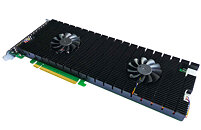
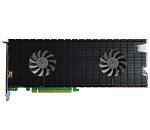
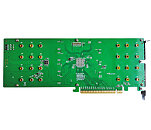
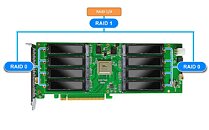
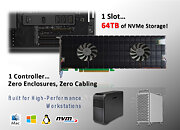
14 Comments on Highpoint Announces SSD7540 8-port M.2 NVMe SSD RAID Card
what's interesting is that it's NOT bootable in RAID mode.
It's funny that i can't find ANY chipset in PLX lineup that fits this board
But all I really really need is 20TB.
4x4 NVME's still be fast as hell.
What dafuck are the drives mounted in then, it looks like an enclosure to me. :wtf: :kookoo:
Here's the 4x m.2 4.0x16 adapter.